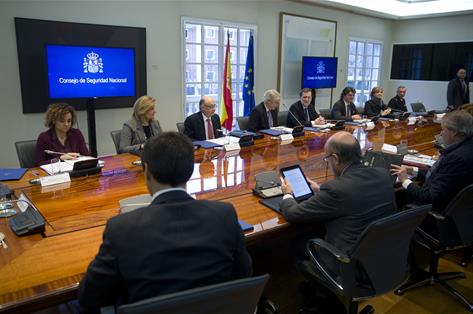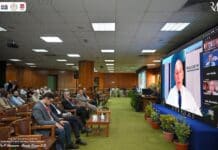
The President of the Government, Mariano Rajoy, chaired the ordinary meeting of the National Security Council on Friday morning at the La Moncloa Complex, at which, for the first time, all members of the government took part.
Jihadist threat
During the course of the meeting, different issues of current affairs and interest for national security were tackled, such as the threat of Jihadist terrorism and its projection in our country. In this regard, it should be recalled that the Evaluation Board of the Terrorist Threat has maintained, since June 2015, level 4 (high risk) of the Counter-Terrorism Alert Level in Spain.
Consequences of the bad weather
The consequences of the snowstorms, cold snap and strong winds suffered in our country were also a priority issue on the agenda.
The council assessed the deployment on the ground of the emergency services to support those people affected, together with the measures adopted to alleviate the effects on infrastructures and on the road and railway networks. The strong energy demand recorded and the weather forecasts for the coming days were also analysed.
It also tackled the situation of instability in different geographic areas of interest for Spain, such as the case of Syria and the deployment of the Spanish Armed Forces overseas.
Annual Report on National Security
In addition, the Annual Report on National Security for 2016 was approved. This is the fourth consecutive report since 2013, which offers a complete and updated diagnostic on the development of risks and threats for our security, the level of compliance with the 2013 National Security Strategy and the actions undertaken by the National Security System over the last year.
The National Security Department of the Office of the Presidency of the Government coordinated the work to prepare the report, which included the active participation of the ministerial departments with responsibilities in different areas of national security.
Its content will be presented to the recently set up Joint Upper/Lower House National Security Committee, as established in the National Security Act.
Strengthening of National Security System
Another of the decisions adopted at this meeting was the strengthening of the National Security System. To achieve this, agreement was reached to set up a committee specialised in energy security and another on non-proliferation.
2017 Strategy
Lastly, the implementation of the process to draw up the 2017 National Security Strategy was established. This process will include extensive participation from the Government of Spain and the different public authorities, as well as from the private sector and civil society, which will be designed to update the map of current risks and threats, as well as the activation of mechanisms to tackle them. These mechanisms include prevention and response, as well as recovery to protect the security and citizen well-being, as well as the interests of Spain, wherever these may be.
The National Security Department of the Office of the Presidency of the Government will be tasked with coordinating the work of the future National Security Strategy. This strategy will be submitted for the consideration of the National Security Council for its subsequent approval by the Council of Ministers by means of a Royal Decree.













